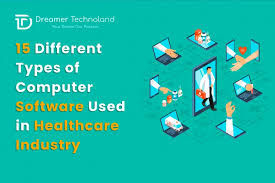The Role of Software in Modern Hospital Pharmacy Operations
- dreamertechnoland
- Jul 11, 2025
- 4 min read
Updated: Jul 18, 2025
The healthcare sector has undergone significant digital transformation, and hospital pharmacies have followed suit. Technology now plays a critical role in ensuring medication safety, regulatory compliance, inventory accuracy, and overall operational efficiency. Software solutions are reshaping how hospital pharmacies operate, enabling them to meet increasing demands while maintaining high standards of care. Hospital pharmacy departments are no longer reliant on manual processes or isolated systems. Advanced software applications integrate pharmacy functions with broader hospital management systems, ensuring that each step in the medication lifecycle— from procurement to patient administration is traceable, efficient, and error-free. In this blog, we will cover the software used in hospital pharmacy and what essential role it plays in the healthcare sector.

The Importance of Software in Hospital Pharmacy
Pharmacy operations in hospitals involve multiple moving parts—dispensing medications, managing stock levels, tracking drug interactions, processing prescriptions, and complying with stringent healthcare regulations. Software solutions have become essential tools in handling these complex workflows.
Digital platforms provide real-time access to drug information, patient records, and treatment histories, reducing the risk of medication errors. Automated prescription validation, barcode scanning, and integration with electronic health records (EHRs) ensure that patients receive the correct medications at the correct dosage and time. These systems also help pharmacists monitor patient allergies and prevent harmful drug interactions.
Software Used in Hospital Pharmacy
Several specialized software applications support hospital pharmacy operations. These include:
Pharmacy Information Systems (PIS): These platforms manage medication dispensing, tracking, and documentation. They also provide decision support by highlighting potential adverse interactions and contraindications.
Computerized Physician Order Entry (CPOE): Physicians enter prescriptions electronically, eliminating handwriting errors and improving communication between departments.
Clinical Decision Support Systems (CDSS): These tools offer real-time alerts and evidence-based recommendations to guide medication use.
Inventory Management Systems: These monitor stock levels, expiry dates, and reorder points, ensuring that essential medications are always available.
Barcode Medication Administration (BCMA): This system scans barcodes on medication packaging and patient IDs to ensure a match, minimizing the risk of human error during drug administration.
These custom software development systems often operate within a larger Hospital Information System (HIS), enabling seamless coordination between pharmacy, nursing, medical, and administrative teams.
How Is Inventory Managed in Hospitals?
Managing pharmacy inventory in a hospital setting is a critical task that directly affects patient care and cost control. Software plays a central role in maintaining an accurate and responsive inventory system. Real-time tracking allows pharmacists to monitor stock levels, identify slow-moving items, and avoid stockouts or overstocking.
Hospitals use automated inventory systems that generate alerts when stock falls below a predefined threshold. These systems also keep track of expiration dates and facilitate first-expiry-first-out (FEFO) protocols to reduce waste. Integration with procurement modules enables automatic reordering and supplier coordination.
Data analytics embedded in these inventory systems support forecasting and budget planning. Hospitals can analyze medication usage trends, optimize order quantities, and make informed purchasing decisions. This level of control minimizes financial loss while ensuring that life-saving medications are always on hand.
Quality Management System (QMS) for Medical Devices
Pharmacy operations often involve the use of medical devices, such as infusion pumps, medication dispensers, and automated compounding machines. Ensuring the safety and compliance of these devices is crucial, and that’s where a Quality Management System (QMS) becomes vital.
QMS software helps hospitals maintain standards throughout the device lifecycle—from acquisition to decommissioning. It ensures that all devices meet regulatory requirements, function as intended, and are maintained regularly. Features typically include:
Document control for policies, procedures, and compliance reports
Audit management for internal and external inspections
Risk management tools to evaluate and mitigate device-related hazards
Calibration and maintenance scheduling for devices used in drug preparation and administration
Using a QMS ensures transparency, traceability, and accountability in managing medical devices within the pharmacy. This contributes directly to patient safety and regulatory readiness.
Conclusion
Software has become the backbone of modern hospital pharmacy operations. It enhances accuracy, efficiency, and patient safety while helping pharmacists manage complex workflows. From accurate prescriptions to inventory control and medication tracking, digital tools improve every aspect of pharmacy management.
Hospitals are increasingly hiring app development company for startups to build agile, scalable pharmacy solutions tailored to evolving clinical needs. These partnerships ensure rapid innovation and cost-effective deployment.
Dreamer Technoland leads this shift with cutting-edge software that streamlines pharmacy processes and integrates seamlessly with hospital systems. Their healthcare expertise helps hospitals improve medication safety, automate routine tasks, and ensure regulatory compliance. Through their custom web development services, Dreamer Technoland delivers reliable, scalable platforms designed to improve operational efficiency and patient outcomes.
As the demands on healthcare systems grow, investing in the right technology partner ensures hospitals remain prepared to deliver safe, timely, and effective care—today and in the future.
Visit our latest Related Blogs:
What Are the Different Types of Ecommerce Applications? Why Every Contractor Need for Construction Estimating Software in 2025?



Comments